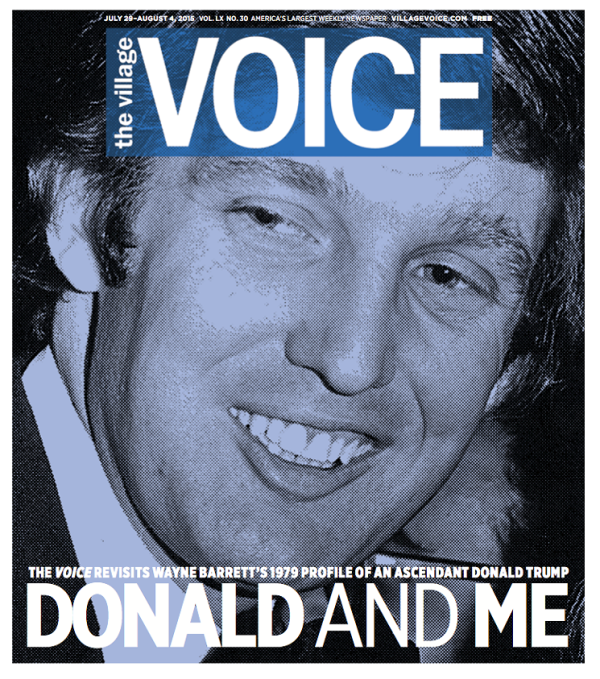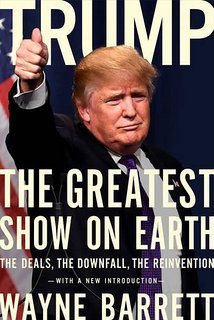
NEW YORK TIMES: Wayne Barrett, the muckraking Village Voice columnist who carved out a four-decade career tilting at developers, landlords and politicians, among them Donald J. Trump and Rudolph W. Giuliani, died on Thursday in Manhattan. He was 71. Mr. Barrett’s voluminous background files from the Trump biography, and his professional courtesy, made his Brooklyn home a mecca for investigative reporters during the recent presidential campaign.
“There may be no journalist in the nation who knows more about Trump than Barrett,” Jennifer Gonnerman wrote in The New Yorker just after the election.
Timothy O’Brien, who was research assistant on the Trump book and who then wrote “TrumpNation,” called Mr. Barrett’s work on Mr. Trump “foundational.”
“He took Trump seriously long before anyone else did,” Mr. O’Brien, now the executive editor of Bloomberg View, said, “and most of the work that followed Wayne’s was built upon his insights.” […]
Mr. Barrett was once asked to explain to students at his son’s elementary school just what raking muck actually meant in terms of a day-to-day job. To appear in character, he put on a trench coat, pulled up the collar, withdrew a pad from his pocket and defined that special breed of investigative journalist this way: “We are detectives for the people.”
He added, “There is also no other job where you get paid to tell the truth.”
But as an argumentative muckraker in the spirit of Jacob Riis, Lincoln Steffens and Ida Tarbell, Mr. Barrett never pretended to be just a dispassionate, impartial journalist. He wielded the power of his pen to lobby for causes and candidates he pronounced deserving and to topple those he vilified. “We thought a deadline meant we have to kill somebody by closing time,” he once wrote. MORE
VILLAGE VOICE: In 1978, when then–Village Voice reporter Wayne Barrett requested several thousand pages of records from the State Urban Development Corporation, the staff there set him up in a conference room so he could review them on site. He sat down alone, at a long table with stacks of papers, and began plowing through them. Barrett was only 33 years old at the time. He’d been on staff at the Voice for less than a year, but the story he was chasing, about a series of multimillion-dollar real estate transactions, was a big one. Some of the city’s most prominent power brokers were involved — including former New York mayor Abe Beame — and at the center was a brash young developer named Donald Trump.
As Barrett was sitting alone at the table doing his research, he was surprised when a nearby phone began to ring. “I didn’t know whether to pick it up or not,” Barrett says today. He couldn’t imagine who might be on the other end; no one but a few government employees could have possibly known he was even in that office. But after a few rings he lifted the receiver and heard an unfamiliar voice. “ ‘Wayne!’ ” Barrett says, his voice  booming, taking on Trump’s now unmistakable accent. “ ‘It’s Donald! I hear you’re doing a story on me!’ I’d never talked to the guy in my life.”
booming, taking on Trump’s now unmistakable accent. “ ‘It’s Donald! I hear you’re doing a story on me!’ I’d never talked to the guy in my life.”
Though he’d been working on the story for several months, he hadn’t yet approached Trump. He was “circling,” as he puts it today, determined to have his ducks in a row by the time he sat down with his subject. It was Trump’s way of letting him know he was keeping an eye on him, Barrett says. After all, the story he was working on, which would land Trump on our cover in January of 1979, wearing a sneer and a mop of brown hair, was the first detailed examination of Trump’s business practices to appear in the press. And the results weren’t pretty. […]
“I made it the old-fashioned way,” Trump said of his fortune.
But Barrett’s reporting paints a picture of Trump’s background that’s somewhat at odds with the one he paints for himself. Far from that of a self-made billionaire, the image of Trump that emerges from Barrett’s reporting is that of a scion of a wealthy family who got ahead, in large part, thanks to family connections — many of them political. Far from an independent capitalist, Barrett showed, Trump was a businessman who relied heavily on government largesse. “This is a guy whose wealth has been created by political connections,” Barrett says today. And at the time the story was published, even Trump’s political connections came secondhand, through his father. The idea that Trump is a business-world antidote to the world of political entanglement, as he often implies, is “ludicrous,” as Barrett puts it.
The articles described how then-mayor Beame and others at the top of the political establishment bent over backward for Trump to help him develop a property owned by the Penn Central Transportation Company into what was to be a multimillion-dollar convention center. Through hefty tax incentives and guaranteed loans, the city offered the young developer a chance to leverage public risk for his own private profit — without putting up a dollar of his own. Over the course of Barrett’s reporting, Trump tried to influence the process in various creative ways. He threatened to sue Barrett, of course. But Trump also apparently tried to bribe him, subtly hinting that he could get Barrett a nice apartment in midtown and move him and his wife out of the Brownsville home where they lived. As if they’d somehow arrived there by accident. MORE
